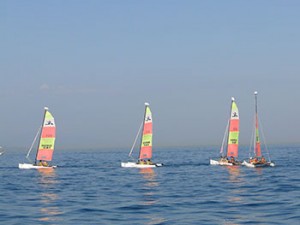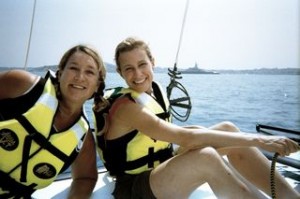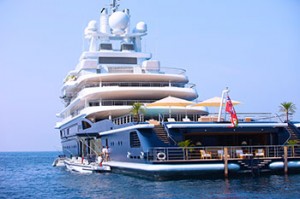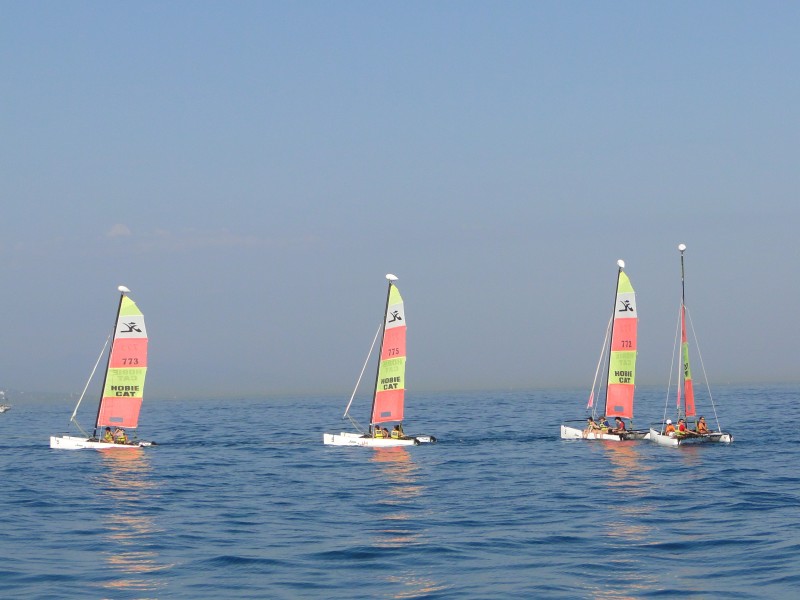A couple weeks ago Judy, an enthusiastic American friend in Antibes, suggested we enroll in a sailing course at l’École Française de Voile.

It wasn’t the first time I’d entertained the idea. Bellevue overlooks the bay where Club Nautique d’Antibes bases its sailing school. With the hub of Old Antibes as the backdrop, one of my favourite views from Bellevue’s wide balcony is the daily parade of children in tiny, blue-and-white striped sailboats that streams through a busy bay into open waters, the boats linked up by cords and pulled by a motorized dinghy.
As the line of little boats slices through a hive of pleasure cruisers and megayachts, jet skis and water skis, fishing vessels and kayaks, swimmers and scuba divers, I think Babar: the mommy elephant navigating her kids, trunks tied to tails, through the wilds of the African jungle.
As a kid, my experiences with sailboats largely consisted of my brother dumping me overboard on any puff of wind. My few sailing attempts as an adult have been more satisfactory – both calming and exhilarating at the same time. And I wanted to know more.
Fortunately l’École Française de Voile also ran classes for an all-embracing, 14+ age group. Judy and I could take on the Hobie Cat 16 Catamaran, a wholly new experience for me. I accepted her proposal with nearly matching gusto, and joined last week’s class for four afternoons of training plus an all-day sail and pique-nique.
Judy and I were not the only adults enrolled in the course. In our class of 17, a whopping six of us were something other than lanky adolescents or flirting mid-20-year olds. Aurélien, our tanned and sporty, mid-20-something instructor, assigned Marc, another grown-up, to Judy and my catamaran. We would be a team.
Straight away, I knew two things about Marc. First, he liked to eat, as evidenced by a sizeable paunch. Second, he spoke French. Just French. Judy rolled her eyes.
The first thing we had to learn was our ship. Aurélien gathered our group at the edge of a Hobie Cat 16. As we baked in the Côte d’Azur’s humid sunshine, he barked the basics and began rigging the machine.
Aurélien pounded one of the Cata’s two hulls. “La coque,” he said. He cast an eye at Judy and me and made some joke about how the word translates to Anglophones. I smirked back.
La barre (literally a bar) controls the two safrans (rudders), and this contraption – the steering mechanism of our boat – would be governed by le stick.
Of course une coque would have un stick. And le stick is always in charge.
Aurélien moved on to the sails. As he hoisted the smaller, front sail – the one we’d call the jib in English – he barked its name: “Le foc!”
Of course it is.

I looked around. No one else smiled. Education is serious stuff in France. And now I began to get serious, too. I wondered how I possibly could go about sailing this week, saying these words to Judy, my American ex-cheerleader friend?
And to Marc, this new Frenchman who would hardly let me resort to more civilized words like “hull” and “jib”?
What would Aurélien say to us as we shoved off into the sea? Mount la coque?
And to get moving – what? – we grab le stick?
Once sailing the high seas, would I summon that ever-useful French verb faire (meaning “to make” or “to do” – the verb used in a huge variety of combinations), and call out to my teammates that I’d fais le foc?
When Aurélien finished his introductory lesson, Judy, Marc and I headed to our stripped Cata. My two sailing mates had taken this course a year earlier, so they scrambled to arrange a mind-boggling array of lines and pulleys, cleats and eyelets. I was still stewing over la coque, le stick and le foc – like it was some big, bad joke, totally on me.
Was le foc like une otarie? I asked Marc. I clapped the back of my hands together like a seal.
Une otarie, I’d discovered last year at the local Marineland, is a sea lion. It looks much like a seal, the poor, unsuspecting species that’s been dubbed by the French as un phoque. When my young daughter was learning her French animal words, I always avoided that flashcard.
Non, Marc told me while rigging the main sail. The jib sail is not like a sea lion. He could’ve ended his sentence with a frank, “Stupid,” but he didn’t. Instead he gave me a moment to explain the linguistic gymnastics going on inside my head between un foc, un phoque, and une otarie. (I waited a day or two to venture into the Anglophone take on le foc.)
Meanwhile our coque was headed into the water. Aurélien gathered the group for a quick explanation of sailing. He spoke in familiar, local French, slurring the Parisian language that most students learn in overseas language schools. Between his accent and my pre-occupation with the Cata’s nomenclature, all I could grasp were two important rules:
(i) Le stick rules everything.
(ii) Le foc should always follow.
Which aren’t bad rules for sailing actually. But I hardly plan to pass them along to my daughter.
Needless to say, my first day of sailing was less than world-class. Aurélien’s sole chance to watch me with le stick held tightly in my fingers brought him motoring alongside our boat, yelling something about the sea and the earth. Even in slight winds and a calm sea, all I could yell back to him was, “Je ne comprends pas.” I don’t understand.
I couldn’t sail. I couldn’t communicate. I couldn’t rig the boat – or unrig it either. I was bottom of the class.

Things improved on Day Two – including my attitude. I learned how to stop the Cata midstream. (Who knew a boat had brakes!) I learned that Marc was an affable man, a retired mathematics and computer teacher from the international high school in Fountainbleu who wished he was more gifted in foreign language. A special treat, our team even grabbed a few close-up looks at Roman Abramovich’s newest beauty, Luna, a 377-foot megayacht complete with aft-deck beach club, that had swanned in to Antibes’ bay.
On Day Two I also grasped the derivation of the word, le boom. It’s the same sailing term in English, just pronounced with a French twist, and denotes the heavy, swinging arm at the bottom of the main sail. (Fortunately in French sailing terminology, le boom hasn’t morphed into le bang.)
Midway through our afternoon aboard the boat, as I kept my left hand firmly wrapped around le stick’s circumference, I let my right hand drift between the main sail’s rope and the top of my scalp. An egg had sprouted but there was no blood.
Day Three brought a Thermique Force 3 wind. The air had become stronger and more changeable. Aurélien, who’d taken to flirting with a couple blond twenty-somethings in the class, aired his concerns about our fleet of six in these seas. As we gathered in the bay, he introduced the concept of sailing into the wind, one of the trickier maneuvers for beginners. He barked orders from a floating dinghy; I strained to hear any phrase. Aboard our Cata, Marc translated Aurélien’s words graphically for Judy and me, creating diagrams with ropes on our boat’s wide trampoline.
Doing is often the best way of learning. That day, when it was my turn to hold le stick (and as we know, the holder of le stick makes the rules), I deviated modestly from Aurélien’s agenda. This was school, I was the student, and I wanted to discover how to manage an oncoming wind from different approaches. I would attack my education from a North American perspective, and specifically the method used at my daughter’s pre-school. I had a curriculum to achieve by the end of the week, but I’d get there in my own, investigative way.
My approach to Aurélien’s assignment ended up putting our Cata scotché – the Frenchman’s delightful term for saying that our boat was completely stuck – in the middle of the sea.
Aurélien sped up to our sailboat. Before he could ask me something I didn’t understand, I simply explained, “J’ai essayé de faire quelque chose, mais il marche pas.” I tried to do something, but it doesn’t work. Aurélien said little and jetted off to another sailboat.
Day Four, as we rigged our craft, Judy tried out her keenest smile and asked Aurélien if our group could take out one of the newer Catas. Each day one or two teams sailed newer boats, ones that were suitable for competition. They were better treated than the typical classroom models, whose coques were dragged daily over a pebble beach by students like us.
Judy shared the outcome of her request with Marc and me. “Aurélien said we didn’t follow his orders yesterday, so we don’t get the good equipment.”
Of course. I’d forgotten. This was French School. In France, education is about following the rules. It’s about learning good habits that will allow students to fit into society. It’s serious business with little room for individual investigation or colouring outside the lines, even in pre-school. And it didn’t matter that the teacher was half my age: Teachers deserve respect. Period.
I had a new appreciation for my ebullient daughter. For once, I understood firsthand why her teacher regularly sent her au coin during her year of French maternelle. Or at the other end of the age spectrum, why a couple French adults I know have long memories of being dubbed nulls (zeroes) in front of their classmates.
Judy looked at Marc and me. “So today we’re going to follow the rules, right?” she said. We’d do whatever Aurélien asked so that we might get good equipment on the last day?
Marc and I agreed, but half-heartedly. Compared with a couple boatloads of younger, more agile classmates, there was little chance we’d be among the best sailors for the day.
Day Four’s biggest challenge came at the end. As Aurélien towed our line of craft back into the school’s beach, he commanded us to unrig the boats completely. Onboard our vessel Marc complained this was a senseless exercise. Judy, on the other hand, remained resolute in her campaign to follow each and every one of the teacher’s orders. As if to underscore her resolve, our task was made more difficult by the dodgy main sail we’d chosen for the day. Being relegated to student equipment on Day Four actually decreased our chances for better gear on Day Five.
Judy stood on the trampoline tugging at the main sail’s line. It was stuck. The main sail wouldn’t budge. She walked out onto the moving boat’s right coque in a bold attempt to free the sail.
“À terre, à terre!” Marc yelled from the trampoline bed. Get down, get down!
“It’s not you who’s my teacher this week!” Judy shouted.
“What do you call this exercise, anyway?” Marc muttered. (The maneuver actually proved useful on Day Five as we unrigged in a neighbouring bay before heading ashore for un pique-nique.)
Judy prevailed. During that 10-minute tow into shore, our threesome managed to unrig the wretched Catamaran. As we came ashore, Aurélien surveyed the teams’ varied rates of success.
Day Five: Judy, Marc and I scored the only competition-level Cata that headed onto the water. What’s more, it was the full-day class! (We later realized that ours was the last team to use the better Cata, but it hardly took the wind from our sails.)
As light winds eased our Cata toward the Plage de la Garoupe in a neighbouring cove, the subject aboard our competition-grade Cata was food. More precisely, it was cheese. Judy maneuvered le stick and I fait le foc. Marc lay back on his elbows and delighted in the beauty of brebis, the saltiness of reblochon, the creaminess of different chèvres, and the universality of comté. He reveled in their pairings with olive tapenades and fig jams. We talked Dutch gouda. We mentioned America’s black-wax encrusted cheese (which I later identified as Bergenost) but agreed it wasn’t a taste contender. Of course we joked about American “cheese food,” too.

Food is among the dearest topics to a Frenchman. “The French…have surrounded food with so much commentary, learning and connoisseurship as to clothe it in the vestments of civilization itself…,” writes Richard Bernstein in Fragile Glory. Here Judy and I, two Americans, were fortunate to witness a grassroots and heartfelt exaltation of this veritable, French form of art.
As I described the creaminess of my favourite bûche aux cendres, a chèvre rolled in ash, I realized that in the past week, our threesome had become a real team. Together we rigged and unrigged. Together we analysed Aurélien’s educational offerings. Together we’d mounted la coque, shared le stick, and fait le foc. And now we were discussing food. I knew I’d miss my teammates on Day Six.
Aurélien bothered us less on Day Five, too. Better equipment allowed us to sail faster (or was it our perfected technique?). We set the course for the class. Marc and I commended Judy for her doggedness on Day Four.
The wind shifted mid-afternoon, emanating from the land and pushing boats back into the sea. It meant that our final approach to l’École Française de Voile was less than exemplary: Our competitive Cata was towed behind a motorized dinghy. But so was the fate of the rest of the class.
Attention shifted to report cards. This was French school, after all, and rules and reports mattered. Aurélien distributed a transparent folder to each pupil. Inside were two booklets: Le Certification des Niveaux et Experiences (basically a summary of how the student performed in class) and La Carte Progression (on which the instructor ticked off prescribed achievements).
I was an adolescent all over again, opening the envelope that contained summarized feedback of a grueling semester. Judy looked over my shoulder. On Le Carte Progression, Aurélien had passed me through Level 1. He’d ticked three boxes in Level 2.
Inside Le Certification des Niveaux et Experiences, he’d made no comment about my mastery of the French language. He’d hardly mentioned my more investigative approach to French schooling. “Bonne volonté!” he wrote. “Good enthusiasm! You progressed well through persevering. Continue in this way and you will progress further! See you soon.”
Our team said a fond farewell, and I walked back to Bellevue swinging the report card in my hand. I was tired and sun-drenched. But I was pleased: The teach thought I did okay. And yet, that’s hardly what matters.
What matters is that I became something of a better sailor. As a bonus, I had a firsthand crack at the French educational experience.
And now, sailing even interests my husband. Always intent on my acquisition of good French terminology, he says he wants to embark on a private course.

